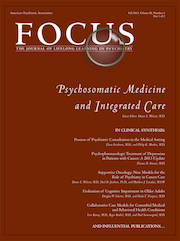Psychopharmacologic Treatment of Depression in Patients With Cancer: A 2013 Update
Abstract
Depression is highly comorbid with various malignancies, and when present often increases suffering, decreases medical adherence, and can be associated with worse clinical outcomes. High-quality meta-analysis suggests a prevalence rate of major depression in cancer patients of around 16%; men and women are equally afflicted. Widely available screening instruments such as the PHQ-9 have demonstrated reliability in both detecting depression symptoms and measuring response to therapy in cancer patients. Certain cancers and some cancer treatments seem to confer increased risk for new-onset or recurrent depression, and there is a wide range of contemporary antidepressant medications, as well as older agents, that can be helpful. Under some circumstances, novel treatments may also have a role.



